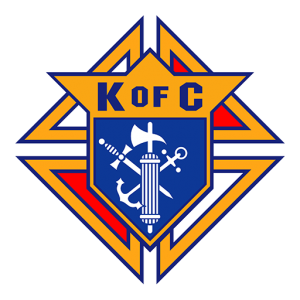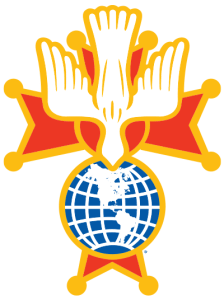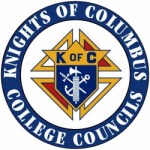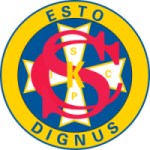Knights

New candidates begin their journey to Knighthood by completing the First Degree ceremony where they learn the lesson of charity. Following the First Degree ceremony, a candidate is considered a Knight of Columbus and can participate in all council activities. First Degree members are encouraged to attain the Second and Third Degrees, which teach the lessons of unity and fraternity. Upon taking the Third Degree, a member receives full honors of Knighthood and is “Knighted.”
Privileges of Third Degree membership include the ability to serve as a local council officer, and admission to state and Supreme Council business meetings. First and Second Degree members can attend the state and Supreme Council meetings, but they are not allowed in the business sessions.
Members who have been in the Knights for one year and have attained Third Degree membership are eligible to join the Fourth Degree Knights.
Fourth Degree Knights

On February 22, 1900, the first Fourth Degree exemplification or degree ceremony was held in New York City. The Fourth Degree imparts a lesson on the virtue of patriotism. The primary purpose of this degree is to foster the spirit of patriotism in members and the community at large and encourage active Catholic citizenship. Today there are some 300,000 Fourth Degree Knights out of the total 1.6 million member Knights of Columbus.
Local units, called assemblies, draw their members from Knights of Columbus councils. The qualifications for membership in the Fourth Degree are: membership in the Knights for at least one year and being a Third Degree Knight.
A Fourth Degree Knight may become part of the assembly’s color corps. These members are recognized widely by their distinctive attire of tuxedo, feathered hat (chapeau), cape and sword. These members regularly take part in civic events such as parades and wreath-laying ceremonies, and at ecclesial functions at Catholic churches. The various colored capes and chapeau feathers denote different officer positions within the Fourth Degree.
College Knights

Many 18 to 22 year old first join the Knights of Columbus in a college council. College Knights are full members of the Order, having all the rights, privileges and responsibilities therein. College Knights belong to units called College Councils. The only difference between a college council and any other local council is that college councils are located on college or university campuses. College Knights lead their councils with the guidance of a financial secretary and a district deputy.
Today there are more than 16,000 college Knights and 160 college councils in the United States, Canada and the Philippines.
Columbian Squires
The Knights of Columbus also sponsors the Columbian Squires, a service and leadership training organization for Catholic young men ages 10 to 18 years old.

This is an organization of more than 20,000 young men who have fun and share their
Catholic faith, help people in need, and enjoy the company of friends in social, family, athletic, cultural, civic and spiritual activities. As a Squire, you’ll be a member of one of more than 1,300 “circles” located throughout the United States, Canada, Mexico, the Philippines, the Caribbean, and other places where Knights of Columbus councils are located. Every circle is sponsored by a Knights of Columbus council, and Knights serve as adult counselors to the group.
A Squires circle is designed to be run both by and for young men. Through their local circle, Squires work and socialize as a group of friends, gradually developing into Catholic leaders.
Squires graduating from the program at age 18 are eligible for college and vocations scholarships offered by the Knights of Columbus Supreme Council office. They are urged to join the Knights to continue their commitment to Columbanism.
If you are a Catholic young man, 10 to 18 years old, you should be a member of the Columbian Squires!
More Information
If you are interested in joining the Knights of Columbus and our local council 5220, please complete our inquiry form or contact our membership director for more information.
